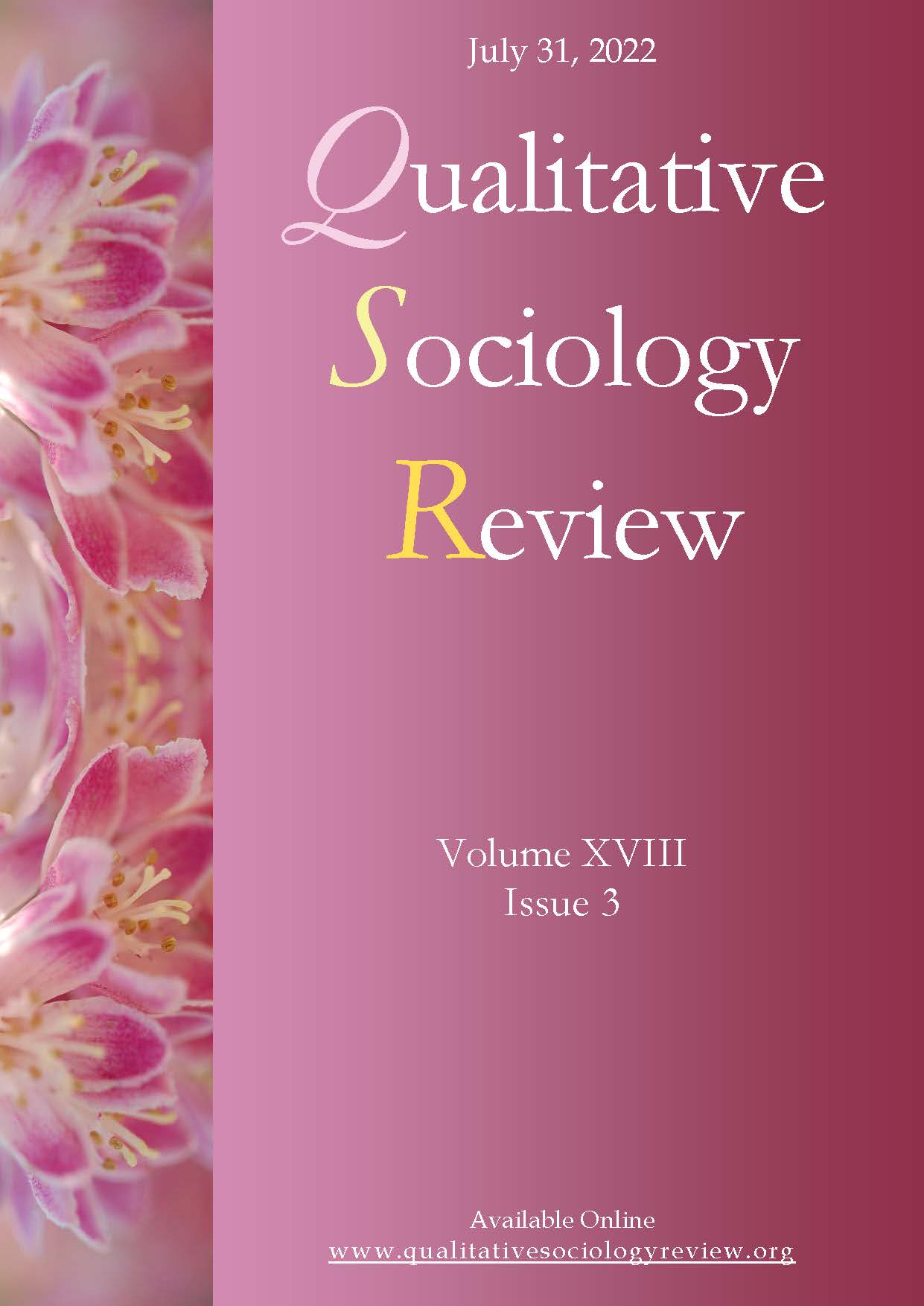Types of Rationality in Discourses on Work in (Post)Transformation Poland
DOI:
https://doi.org/10.18778/1733-8077.18.3.03Keywords:
Rationality, Type of Rationality, Work, Reflexive Modernization, PolandAbstract
Rationality is the key concept for understanding the reproduction of social life in the era of reflexive modernization. A fusion of lessons learned from the constructivist view of the world and analysis of the hermeneutic category of pre-understanding has become the basis of my belief that rationality is nowadays the basic modal concept, and the forms of its existence shape the order of social life. In my research practice, rationality has become a link between my interest in work and the theory of social order development. In this paper, I briefly present the relations between the notion of rationality and the theory of reflexive modernization. Then, I present my research path and the tools used in the analyses. The most important part is devoted to the effects of the conducted research. I classify and describe the types of rationality present in discourses on work in Poland. The discourses of politicians, experts, and the so-called “ordinary people” were analyzed.
Downloads
References
Beck, Ulrich. 1998. “Politics of Risk Society.” Pp. 9-22 in The Politics of Risk Society, edited by J. Franklin. Cambridge: Polity Press.
Google Scholar
Beck, Ulrich. 2005. Władza i przeciwwładza w epoce globalnej. Nowa ekonomia polityki światowej [Power in the Global Age: A New Global Political Economy]. Warsaw: Wydawnictwo Naukowe Scholar.
Google Scholar
Beck, Ulrich, Anthony Giddens, and Scott Lash. 1994. Reflexive Modernization. Cambridge: Polity Press.
Google Scholar
Bourdieu, Pierre and Loïc Wacquant, eds. 2008. An Invitation to Reflexive Sociology. Cambridge: Polity Press.
Google Scholar
Burszta, Wojciech et al. 2017. “Dyskusja: Modernizacja, praca, przedsiębiorczość w polskich dyskursach (post)transformacyjnych [Discussion: Modernization, Work, Entrepreneurship in Polish (Post)Transformational Discourses].” Władza Sądzenia 11:12-31.
Google Scholar
Chouliaraki, Lilie and Norman Fairclough. 2002. Discourse in Late Modernity: Rethinking Critical Discourse Analysis. Edinburgh: Edinburgh University Press.
Google Scholar
Czyżewski, Marek, Kinga Dunin, and Andrzej Piotrowski, eds. 2010. Cudze problemy: o ważności tego, co nieważne: analiza dyskursu publicznego w Polsce [Somebody Else’s Problems: On the Importance of What Is Unimportant: Analysis of Public Discourse in Poland]. 2nd ed. Warsaw: Wydawnictwa Akademickie i Profesjonalne.
Google Scholar
Czyżewski, Marek, Sergiusz Kowalski, and Andrzej Piotrowski. 2010. Rytualny chaos. Studium dyskursu publicznego [Ritual Chaos. Study of Public Discourse]. Cracow: Wydawnictwa Akademickie i Profesjonalne.
Google Scholar
Dijk, Teun Adrianus van. 2001. Dyskurs jako struktura i proces: praca zbiorowa [Discourse as Structure and Process]. Warsaw: Wydawnictwa Naukowe PWN.
Google Scholar
Duszak, Anna and Norman Fairclough. 2008. Krytyczna analiza dyskursu: interdyscyplinarne podejście do komunikacji społecznej [Critical Discourse Analysis: An Interdisciplinary Approach to Social Communication]. Cracow: Towarzystwo Autorów i Wydawców Prac Naukowych Universitas.
Google Scholar
Fairclough, Norman. 2003. Analysing Discourse: Textual Analysis for Social Research. London, New York: Routledge.
Google Scholar
DOI: https://doi.org/10.4324/9780203697078
Foucault, Michel. 1988. “Politics and Reason.” Pp. 57-85 in Politics, Philosophy, Culture: Interviews and Other Writings, 1977-1984, edited by L. D. Kritzman. New York: Routledge.
Google Scholar
Foucault, Michel. 2010. Bezpieczeństwo, terytorium, populacja [Security, Territory, Population]. Warsaw: Wydawnictwo Naukowe PWN.
Google Scholar
Garfinkel, Harold. 1984. Studies in Ethnomethodology. Cambridge: Polity Press.
Google Scholar
Giddens, Anthony. 1997. The Consequences of Modernity. 6th ed. Stanford, CA: Stanford University Press.
Google Scholar
Grice, Paul. 1980. “Logika i konwersacja [Logic and Conversation].” Pp. 91-114 w Język w świetle nauki [Language in the Light of Science], edited by B. Stanosz. Warsaw: Czytelnik.
Google Scholar
Habermas, Jürgen. 2007a. Reason and the Rationalization of Society. Boston, MA: Beacon Press.
Google Scholar
Habermas, Jürgen. 2007b. Lifeworld and System: A Critique of Functionalist Reason. Cambridge: Polity Press.
Google Scholar
Kamberelis, George and Greg Dimitriadis. 2014. “Wywiady zogniskowane. Strategiczne artykulacje pedagogiki, polityki i badań [Focus Interviews. Strategic Articulations of Pedagogy, Politics, and Research].” Pp. 351-390 in Metody badań jakościowych [Qualitative Research Methods], vol. 2, edited by N. K. Denzin and Y. S. Lincoln. Warsaw: Wydawnictwo Naukowe PWN.
Google Scholar
Kubala, Konrad. 2019. Racjonalność w dyskursach o pracy w Polsce (po) transformacyjnej [Rationality in Discourses on Work in (Post)Transformational Poland]. Lodz: Wydawnictwo Uniwersytetu Łódzkiego.
Google Scholar
Lakoff, George. 2014. The All-New Don’t Think of an Elephant! Know Your Values and Frame the Debate. White River Junction, VT: Chelsea Green Publishing.
Google Scholar
Luhmann, Niklas. 1995. Social Systems. Stanford, CA: Stanford University Press.
Google Scholar
Mills, C. Wright. 2000. The Sociological Imagination. Oxford, New York: Oxford University Press.
Google Scholar
Parsons, Talcott. 1991. The Social System. London: Routledge.
Google Scholar
Schütz, Alfred. 1982. Collected Papers. The Hague: Martinus Nijhoff.
Google Scholar
Schütz, Alfred. 2008. O wielości światów. Szkice z socjologii fenomenologicznej [On Multiple Realities]. Cracow: Zakład Wydawniczy Nomos.
Google Scholar
Weber, Max. 2002. Gospodarka i społeczeństwo: zarys socjologii rozumiejącej [Economy and Society: An Outline of Interpretive Sociology]. Warsaw: Wydawnictwo Naukowe PWN.
Google Scholar
Weber, Max. 2019. Economy and Society: A New Translation. Cambridge, MA: Harvard University Press.
Google Scholar
DOI: https://doi.org/10.4159/9780674240827
Woroniecka, Grażyna. 2003. Interakcja symboliczna a hermeneutyczna kategoria przed-rozumienia [Symbolic Interaction and the Hermeneutic Category of Pre-Understanding]. Warsaw: Oficyna Naukowa.
Google Scholar
Wynne, Brian. 1996. “May the Sheep Safely Graze? A Reflexive View of the Expert-Lay Knowledge Divide.” Pp. 44-83 in Risk, Environment and Modernity: Towards a New Ecology, edited by S. Lash, B. Szerszynski, and B. Wynne. London, Thousand Oaks, New Delhi: Sage.
Google Scholar
DOI: https://doi.org/10.4135/9781446221983.n3
Downloads
Published
How to Cite
Issue
Section
License

This work is licensed under a Creative Commons Attribution-NonCommercial-NoDerivatives 4.0 International License.











